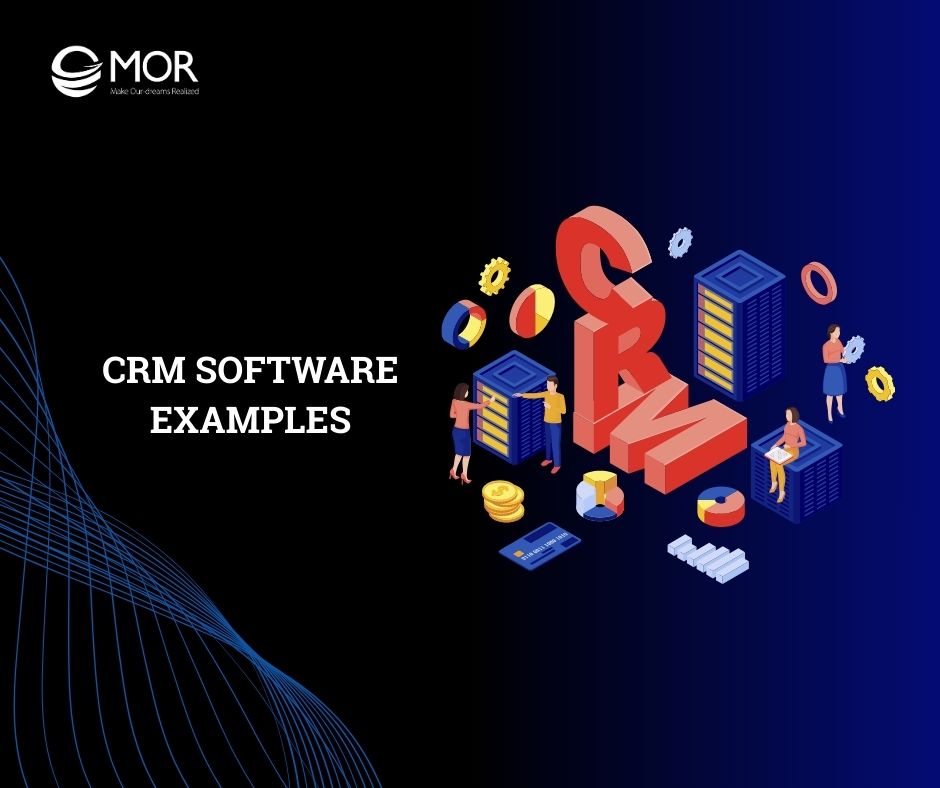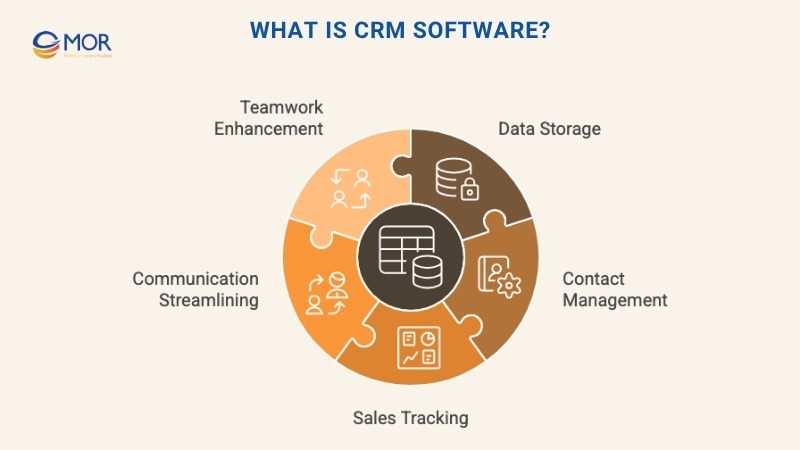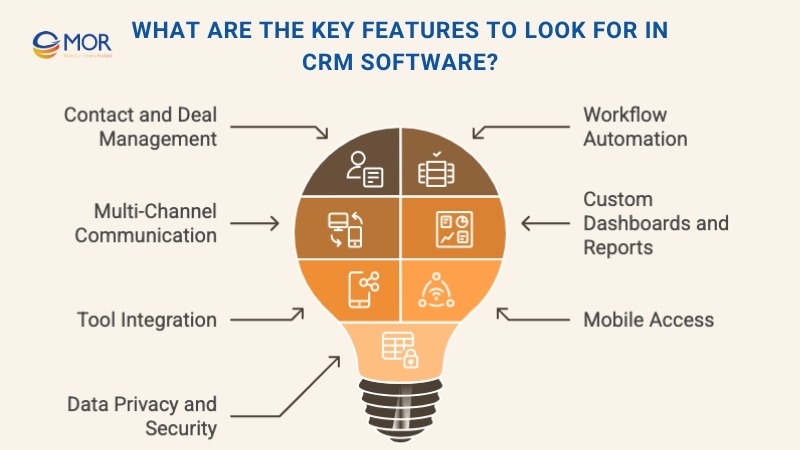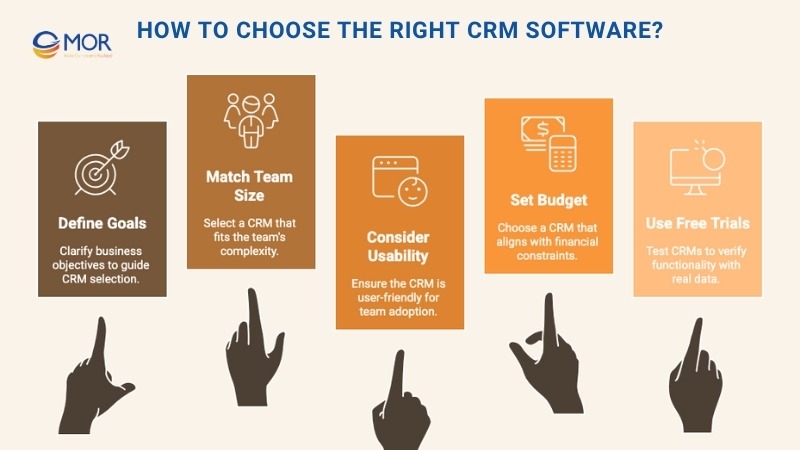TOP 10 CRM Software Examples That Help Businesses Grow in 2026

Tired of patchwork spreadsheets and missed deals? You’re not alone. Many teams run into roadblocks when managing leads, tracking customers, or just keeping the sales train on the rails. This MOR Software’s guide highlights CRM software examples that help businesses grow fast in 2026. We break down real-world use cases so you can skip guesswork and focus on scaling.
What Is CRM Software?
The simple answer: CRM, or Customer Relationship Management software, is the digital nerve center for customer data and sales activities.
Think of it as your business’s central hub for managing contacts, tracking deals, and logging every customer interaction, from first hello to repeat order. Instead of hunting through email threads or sticky notes, all your info lives in one organized place.

Analysts value the global CRM market at about USD 101.41 billion in 2024, and they project it will reach USD 262.74 billion by 2032, a 12% annual growth clip.
But it’s more than storage. CRM software examples help your team keep up with fast-moving leads, nurture long-term clients, and avoid costly mix-ups. Sales, marketing, and support teams all work from the same playbook. Communication gets easier. Every customer feels remembered.
It doesn’t matter if you’re selling online or face-to-face, or whether you run a two-person shop or a global team. The best CRM program examples pull together every customer touchpoint so you can act faster, sell smarter, and collaborate better.
What Are the Key Features to Look For in CRM Software?
Picking from the endless crm systems list can get overwhelming. But the winners usually tick off a few key boxes:

- Contact and deal management: Organize all customer info, deals, and history in one place. No more scrambling for notes before a call. It is little surprise that 91% of companies with 11 or more employees already rely on a CRM platform for daily work.
- Workflow automation: Set reminders, auto-assign leads, or trigger follow-ups. This lets you focus on closing, not clicking.
- Multi-channel communication: Manage calls, emails, chats, and even social DMs, right inside your CRM.
- Custom dashboards and reports: Track performance, spot trends, and make smarter decisions with real-time data.
- Integration with favorite tools: Plug in your email, marketing apps, accounting software, or chat tools. Fewer tabs, more teamwork.
- Mobile access for remote teams: Access pipelines or client details on the go, perfect for field sales or hybrid work. Companies that equip reps with a mobile CRM see 65% of those teams hit their sales quotas.
- Data privacy and security tools: Protect customer info and stay compliant, even as your business scales.
When shopping for crm software examples, keep these features top of mind. The right mix makes growth a lot smoother.
Why CRM Software Matters for Business Success?
Anyone can start with a spreadsheet. But fast-growing businesses outgrow them fast. Real crm software examples show why switching to a CRM isn’t just an upgrade. It’s a necessity.

- Centralizes customer info: No more lost leads or duplicate data. Everyone works from a single source of truth. Nucleus Research reports an average return of $8.71 for every dollar invested in CRM tools.
- Improves team coordination: Sales, marketing, and support all pull in the same direction. Hand-offs happen with zero drama. McKinsey adds that smart automation driven by CRM can raise a rep’s active selling time by 15 to 20%.
- Automates follow-ups and tasks: Deals don’t fall through the cracks. Reps can focus on building relationships, not chasing paperwork.
- Provides clear analytics and reports: Know what’s working (and what’s not) with one glance at your dashboard.
- Boosts satisfaction and retention: Happy customers come back and bring friends. Forbes notes that 84% of companies focused on better customer experience have already seen revenue rise.
‘Efficiency’ is nice, but growth is the real story. The best crm platform examples prove that the right system pays for itself.
TOP 10 Best CRM Software Examples You Should Know
Business owners and IT leads often ask, "What is crm software examples that actually make a difference?" We’ve broken down the crm software examples getting real results in 2026, matched to different business needs.

1. Salesforce – For Complex Sales and Enterprise Growth
Salesforce tops nearly every crm systems list. There’s a reason Fortune 500 giants and fast-scaling firms rely on it.
- Automation & Analytics: From deal scoring to AI-powered forecasts, Salesforce helps teams spot the hottest leads and close bigger deals.
- Customizable Workflows: Whether you’re handling B2B enterprise sales or a high-volume pipeline, you can shape the platform to fit.
- Integration Power: Connects with thousands of apps and tools, so your workflow stays uninterrupted. Salesforce data shows CRM apps can lift sales by up to 29%, productivity by 34%, and forecast accuracy by 42%.
Salesforce’s ‘Einstein’ AI and deep reporting make it the best crm for complex, high-value sales. If you’ve got multi-stage pipelines, or need to juggle lots of data, Salesforce sets the pace.
2. HubSpot – Best for Inbound Marketing and Small Teams
HubSpot CRM packs a punch for small businesses and marketers.
- Free Plan: Includes contact management, deal tracking, live chat, and basic reporting, at zero cost for small teams.
- SEO & Content Tools: Automate blog publishing, email drips, and landing page creation.
- Smooth Integrations: Marketing, sales, and service modules all talk to each other.
Plenty of examples of crm software highlight HubSpot’s clean interface and easy setup. It’s one of the most user-friendly crm program examples out there, especially for beginners or fast-moving startups.
3. Zoho CRM – Best for Flexibility and Customization
Zoho CRM wins fans for its flexibility and price point.
- Omnichannel Communication: Email, phone, social, and live chat, all tracked in one system.
- AI Assistance: Zia, the built-in AI automation, recommends next steps and scores leads.
- Automation: Set up workflow rules for follow-ups, assignment, and reminders.
Zoho scales from startup to enterprise. It’s perfect if you need a highly tailored tool. On the long crm systems list, Zoho is always near the top for customization without big-enterprise headaches.
4. Flowlu – All-in-One Business and CRM Platform
Sometimes you need more than just a CRM. Flowlu blends customer management, project planning, invoicing, and sales all in one platform.
- Integrated Features: Manage projects, send invoices, track deals, and log client communications from a single dashboard.
- Visual Sales Pipeline: Color-coded, drag-and-drop deal stages make sales progress easy to see at a glance.
- Automation: Automate recurring tasks and reminders so nothing gets missed.
Flowlu is one of the best examples of customer relationship management software for service-based firms, consultants, and agencies who want everything under one roof.
5. Zendesk Sell – For Customer Support and Ticket Management
Zendesk Sell started as a help desk tool, but now it’s a full-blown CRM for support-driven businesses.
- Ticketing & Live Chat: Track requests, automate responses, and centralize all client conversations.
- Knowledge Base & Reporting: Capture FAQs and monitor support metrics for better service.
- Customer Insights: Centralized profiles mean faster, more personal responses.
For companies where customer support drives retention, Zendesk Sell stands out among crm software example options.
6. Pipedrive – For Sales-Driven SMBs
Pipedrive was built by salespeople, for salespeople.
- Visual Pipelines: Easy drag-and-drop deal tracking.
- Reminders & Activity Tracking: Never miss a follow-up or deadline.
- Quick Setup: No complex training required.
It’s a favorite crm platform example for small and mid-sized businesses that want to stay organized and keep their sales moving.
7. Freshworks – CRM with Strong Sales Monitoring Tools
Freshworks (sometimes called Freshsales) stands out for deal tracking and email integration.
- Custom Dashboards: Keep sales, email, and activities visible for the whole team.
- Timeline Views: See the complete customer journey at a glance.
- Mobile App: Update pipelines or contact clients on the go.
Teams who depend on email campaigns, fast responses, or want ‘one screen for everything’ love Freshworks.
8. ActiveCampaign – For Email Marketing and Automation
If marketing automation tops your wish list, ActiveCampaign is worth a look.
- Advanced Automation: Trigger emails, SMS, or custom actions based on client behavior.
- Personalization with AI: Segment audiences, score leads, and recommend content.
- Campaign Reporting: Measure everything, tweak what works, and see ROI fast.
It’s one of those examples of crms that bridges sales and marketing, great for businesses that nurture leads across channels.
9. Microsoft Dynamics 365 – For End-to-End Business Operations
Looking for a CRM solutions that handles everything from sales to finance? Microsoft Dynamics 365 does it all.
- ERP & CRM Together: Link customer management with accounting, inventory, and HR.
- Microsoft Ecosystem: Connects directly to Teams, Outlook, and other Microsoft apps.
- Custom Workflows: Tailor the experience for industry-specific needs.
On the crm systems list, Dynamics is the heavyweight for enterprises that want a single source for all business data.
10. BIGContacts – For Simple, Effective Contact Management
BIGContacts is proof that not every team needs a giant CRM platform.
- Easy Import: Bring in contacts from spreadsheets, organize and segment instantly.
- Reminders & Email Tracking: Never lose touch or miss an opportunity.
- Intuitive Design: Great for solo pros, small teams, or anyone wanting a ‘less is more’ approach.
BIGContacts earns a spot among crm software examples for its focus on clarity and simplicity.
CRM Software Comparison Table
CRM Tool | Best For | Starting Price | Free Plan/Trial |
Salesforce | Complex sales, enterprise | $25/user/month | 30-day trial |
HubSpot | Inbound, small teams | Free; Paid $15/mo | Free plan |
Zoho CRM | Customization, flexibility | $14/user/month | 15-day trial |
Flowlu | All-in-one business | $39/8 users/month | Free plan |
Zendesk Sell | Support, ticketing | $19/user/month | 14-day trial |
Pipedrive | SMBs, sales-driven teams | $14.90/user/month | 14-day trial |
Freshworks | Sales monitoring, email | $15/user/month | 21-day trial |
ActiveCampaign | Email automation | $29/user/month | 14-day trial |
Dynamics 365 | Enterprise, full operations | $65/user/month | 30-day trial |
BIGContacts | Simple contact management | $5/user/month | 15-day trial |
You can also visit the MOR Software homepage for more solutions or contact us for expert guidance on matching the right CRM tool to your business.
How to Choose the Right CRM Software for Your Business?
You’ve seen the crm software examples that deliver, but how do you pick one? It starts with a sharp look at your needs, not what’s trendy.

Identify Your Primary Goals
What matters most? Some companies want to close deals faster. Others need better marketing analytics or smoother support hand-offs. Pin down your goals before comparing crm software example options.
Retention deserves special attention. Harvard Business Review finds that improving customer retention by just 5% can raise profits from 25 to 95%.
Do you need better sales tracking, or is automating your follow-up the main headache? If reporting keeps you up at night, put dashboards and analytics high on the must-have list.
Consider Team Size and Technical Skills
A five-person startup can move fast with a tool like HubSpot or BIGContacts. Larger, specialized teams might need the salesforce customization and depth found in Salesforce or Microsoft Dynamics.
Ease of use should never be overlooked. The best crm is one your team actually enjoys using. Test-drive a few examples of crm software before committing.
Set a Realistic Budget
Startups can stick to free or low-cost options. As you scale, investing in a full-featured solution pays off. Just be honest about what you really need.
Enterprise tools like Salesforce or Dynamics bring more firepower but at a higher price. HubSpot, Zoho CRM, or Flowlu can deliver plenty of value at a friendlier price.
Try Before You Buy
Don’t trust sales pitches alone. Free trials or demos help you put the best crm software examples to the test, using your real data, workflows, and team.
You’ll spot quirks and deal-breakers quickly. That’s time well spent.
Conclusion
Businesses that thrive in 2026 don’t rely on memory or scattered spreadsheets. The right CRM brings clarity, accountability, and a pipeline you can count on. No matter where you’re starting, the right tool is out there. Ready to see which CRM fits your needs? Contact MOR Software for tailored advice. Let’s build stronger customer relationships, one real conversation at a time.
MOR SOFTWARE
Frequently Asked Questions (FAQs)
What is a crm example?
Salesforce, HubSpot, and Zoho CRM are classic examples used by sales, marketing, and support teams to manage contacts, automate tasks, and close more deals.
What types of businesses use CRM software?
From scrappy SaaS startups to global banks, all sorts of businesses rely on CRM. That includes retail, finance, healthcare, education, and beyond.
Are there free CRM software options?
Yes. HubSpot, Zoho CRM (with some limits), and Flowlu all provide free plans for small teams or basic needs.
How is CRM different from ERP?
CRM software handles relationships, sales, and support. ERP covers finance, inventory, and back-office processes. Some platforms, like Microsoft Dynamics, merge both worlds.
What’s the most user-friendly CRM?
HubSpot and Pipedrive are often named the most approachable and easy to get started. They make onboarding quick, so teams can hit the ground running.
Rate this article
0
over 5.0 based on 0 reviews
Your rating on this news:
Name
*Email
*Write your comment
*Send your comment
1